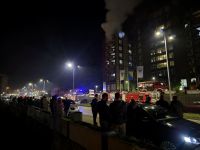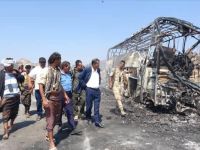Albawaba.Com
Rabat
An average of 174 people are killed or injured each day on Morocco's roads. There are nearly eight times more crashes than in France, and fifteen times as many as Italy, according to a new report.
The report by the Moroccan Road Accidents Prevention Committee placed the north African country at the top of the global rankings for traffic accidents.
It said the statistics have been getting worse, with the number of accidents rising from 27,000 in 1987 to 40,782 last year.
"Road accidents have reached intolerable levels in Morocco," the Moroccan transport ministry admitted. "In 1997 they killed or injured 63,658 people and cost the country 68 million dollars - 2.7 percent of our gross domestic product."
In one of the latest disasters, 24 passengers were killed this month in a bus crash en route to Marrakesh in southern Morocco.
"In a very short amount of time, these innocent people's happiness was turned into a nightmare, because of the carelessness of drivers who recklessly plunge families into grief and bereavement," said Ahmed Benich, whose two sons perished in the crash.
The increasing tally of accidents and fatalities raises the question of who or what is to blame.
Some accuse drivers who ignore speed limits and highway rules, while others point a finger at the country's dilapidated roads and aging vehicles.
"Morocco has become a real graveyard for worn-out cars and buses imported from Europe," said Nadim Abdellatif of the Moroccan Road Accidents Prevention Committee. "These vehicles, most of which are more than 10 years old, are the major cause of road accidents."
But for Abdel-Ghafour Madeh, a civil servant who takes the bus to and from work everyday, says reckless driving plays its part, too. Bus drivers, he said, sometimes engage in frantic races with buses from other companies in order to win more passengers.
"In some cases, such races turn into real corridas and carnage," he added. Houari Lorch, a bus driver, is irritated by such accusations, and blames the "carelessness" of passers-by, motorcyclists and taxi drivers.
He admitted, however, that some transport companies do require their drivers to bring back as much money as possible in fares. This encourages drivers not to respect the rules of the road, to overtake at random, or to stop without warning to pick up more passengers.
"Unfortunately, these races cost many innocent lives," Lorch added.
"The drivers of these machines are well protected inside their cabs," commented Rahma Naji, whose husband was killed in a road accident. "The only law they obey is the law of the jungle."
Young men are also held responsible for causing a large number of crashes. "Some young people transform their cars into 'mobile discos' equipped with hi-fi systems to pick up girls on the street," said Nadim Abdellatif. "The situation is worse on Friday and Saturday evenings, when alcohol makes these youngsters a real danger to the public."
The Transport Department has been asking all parties concerned to do what they can to improve the situation.
"It seems that everyone involved in the transport sector is more concerned about blaming other people than about looking for an effective solution to the problem," said Ali Ez-Zaid, a Transport Department official. "Instead of this endless spiral of recrimination, they should be trying to improve matters and spare the country this continuous bloodshed."
Transport authorities have announced various measures to tackle the problem, such as toughening the requirements for granting driving licenses, and the establishment of a center to train drivers of heavy goods vehicles.
They are also working to promote public awareness of the problems and to encourage wider respect for traffic regulations.
But, said Ali Ez-Zaid, "these accident-prevention campaigns are doomed to failure if the people who are supposed to serve as a role model for others are the first to break the laws."
© 2000 Al Bawaba (www.albawaba.com)







